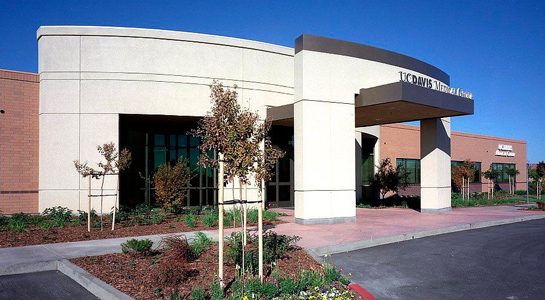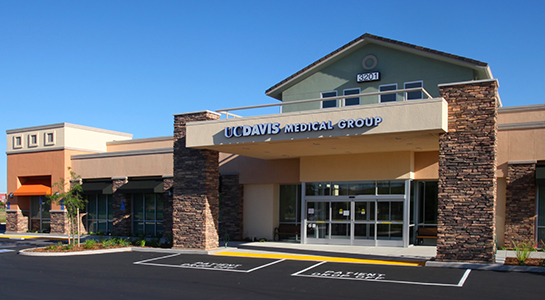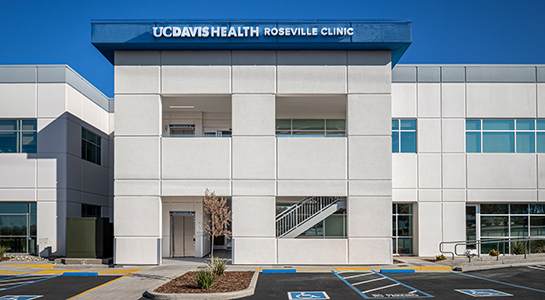Prediabetes
Prediabetes may be reversible – and doesn’t have to become type 2 diabetes. We help you take back control of your health.
Medically reviewed by Jose Joaquin Lado Abeal, M.D. on Feb. 22, 2024.

Top-Ranked Diabetes Care
At UC Davis Health, we’re committed to helping people identify and manage prediabetes as early as possible. U.S. News & World Report ranks us among the top 50 hospitals nationwide for both adult and pediatric diabetes and endocrinology.
We provide the testing, education, and guidance you need to make lifestyle changes for long-term wellness.
What Is Prediabetes?
Prediabetes means your blood sugar levels are higher than normal, but you do not yet have type 2 diabetes. The prediabetes range for a person's blood sugar level is between 100-125 milligrams per deciliter (mg/dl). This is higher than normal, but not in the range of having diabetes.
Prediabetes is a condition that should be taken as a warning sign. Without treatment, prediabetes is likely to develop into type 2 diabetes, which usually cannot be reverted.
About 96 million adults in the U.S. have prediabetes. The condition is also on the rise in children. Studies show that 1 in 5 children are at risk of developing type 2 diabetes.
Type 2 diabetes increases your risk of:
- Eye problems, such as diabetic retinopathy, cataracts and glaucoma
- Diabetic foot ulcers
- Heart disease
- Kidney disease (diabetic nephropathy)
- Nerve damage
- Stroke
- Vascular disease
Prediabetes might not cause symptoms, so about 80% of people with the condition don’t know they have it. With a healthy diet, exercise and weight loss, you can overcome prediabetes and prevent type 2 diabetes.
Signs of Prediabetes
Prediabetes rarely causes symptoms, but there are symptoms of diabetes. In some cases, you may notice darkened patches of skin or skin tags on your neck or under your armpits.
Some research suggests that certain people develop early diabetic retinopathy and neuropathy when they have prediabetes. Weakened blood vessels in your retina (area in the back of your eye) can lead to vision problems.
Symptoms of diabetes
- Constant thirst, despite drinking lots of liquids
- Frequent urination, especially during the night
- Unexpected weight loss
- Hunger, despite eating normally
- Fatigue and weakness
- Blurred vision
- Tingling or numbness in the hands or feet
- Slow healing of cuts and sores
Prediabetes Causes
Your pancreas produces insulin. This hormone helps move sugar (glucose) to your cells from your blood, so it can be used for energy. But if you have prediabetes, your cells resist the insulin and don’t get enough sugar.
Your pancreas makes more insulin to fix the problem, but over time, sugar builds up in your blood and can lead to prediabetes. Eventually, your pancreas produces less insulin, and your blood sugar levels go even higher, which results in type 2 diabetes.
Experts believe that insulin resistance in your cells is related to:
Obesity
Excess body weight, especially around your waistline, and cellular inflammation related to obesity may prevent your cells from using insulin as they should.
Physical Inactivity
Exercise helps your body use sugar efficiently. If you aren't physically active, too much sugar stays in your blood and contributes to insulin resistance.
Prediabetes Risk Factors
You are also at a higher risk for prediabetes based on your:
Age
People over the age of 45 are more likely to develop prediabetes.
Ethnicity
Prediabetes is more common in certain ethnic groups, including African Americans, American Indians, Asian Americans, Hispanics/Latinos, Alaska Natives, Native Hawaiians and Pacific Islander Americans.
Family History
Having a parent or sibling with diabetes increases your risk of developing prediabetes and type 2 diabetes.
Health Conditions
You’re more likely to develop prediabetes if you have high cholesterol, high blood pressure, sleep problems or certain hormonal disorders. A history of gestational diabetes, heart disease, polycystic ovary syndrome (PCOS) or stroke also increases your risk.
Medications
Corticosteroids, antipsychotics, statins, some blood pressure medications and certain HIV medications may raise your blood sugar.
Smoking
The chemicals in cigarettes cause inflammation and cellular damage, which may make your cells more likely to resist insulin.
Diagnosing Prediabetes
Your health care provider does simple blood tests to measure your glucose levels (or the amount of sugar in your blood). A normal blood glucose level (or blood sugar level) between meals is less than 100 milligrams per deciliter (mg/dl).
A blood sugar level of 126 mg/dl or higher after fasting for 12 hours or more than 200 mg/dl two hours after eating is cause for concern. This is a characteristic of diabetes.
Common Prediabetes Tests Include:
Fasting Plasma Glucose Test
Your provider takes a blood sample after you’ve been fasting (not eating or drinking anything except water) for about eight hours. This test measures your blood sugar at a single point in time. Most people receive this test during physicals or routine check-ups, even without diabetes risk factors.
A1C Test
An A1C test measures your average blood sugar levels over the last three months. It’s more reliable than a plasma glucose test since the average accounts for blood sugar fluctuations (up and down changes) due to stress, diet or illness. An A1C level between 5.7% and 6.4% means you have prediabetes. If you have prediabetes, diabetes or diabetes risk factors, your provider will tell you how often you need an A1C test.
Prediabetes Treatments at UC Davis Health
At UC Davis Health, our endocrinologists offer the full range of care for people with prediabetes and those at high risk for type 2 diabetes. We offer diabetes health education classes, diabetes testing and convenient diabetes clinics throughout Sacramento.
Your diabetes specialist builds a personalized plan to reverse prediabetes and help you get your health back on track. We also offer specialized services for children at risk for type 2 diabetes at our pediatric endocrinology and diabetes program.
Treatments for Prediabetes May Include:
Prediabetes Diet
We connect you with a registered dietitian who can help you make healthier food choices. A well-rounded diet focuses on whole grains, non-starchy vegetables and low-fat proteins such as chicken or fish. You limit sugar, alcohol and simple carbohydrates like white bread and pasta.
Exercise
Our diabetes specialists can recommend ways to gradually incorporate more exercise into your life, such as walking, strength training and low-impact aerobics. Research shows that you can cut your risk of type 2 diabetes in half by exercising for 30 minutes each day and sticking to a healthy diet.
Weight Loss
Even losing a small amount of weight (around 5% to 7% of your total body weight) can reduce your risk of type 2 diabetes. At UC Davis Health, we offer a comprehensive non-surgical weight loss program as well as weight management and health education classes.
Medication
Metformin is a medication that helps control your blood sugar. Research is ongoing about the benefits of metformin for people with prediabetes.
Preventing Prediabetes
You can lower your risk of prediabetes and type 2 diabetes by:
- Eating a healthy diet
- Exercising regularly
- Getting regular prediabetes tests based on your risk level
- Keeping chronic health conditions under control
- Losing weight
- Not smoking
“National Diabetes Statistics Report,” Centers for Disease Control and Prevention (CDC), https://www.cdc.gov/diabetes/data/statistics-report/index.html
“Prediabetes – Your Chance to Prevent Type 2 Diabetes,” CDC, https://www.cdc.gov/diabetes/basics/prediabetes.html
“Prediabetes Deserves More Attention: A Review,” NIH National Library of Medicine, https://pubmed.ncbi.nlm.nih.gov/33132502/
“Exercise and diet reduce risk of diabetes, US study shows,” NIH National Library of Medicine, https://www.ncbi.nlm.nih.gov/pmc/articles/PMC1120973/
How common is it?
1 in 3People in the U.S. have prediabetes
Awareness
80%People that don’t know they have prediabetes
Source: Centers for Disease Control and Prevention (CDC): Prediabetes - Your Chance to Prevent Type 2 Diabetes
Request an Appointment
As Sacramento's No. 1 hospital, you'll benefit from unique advantages in primary care and specialty care. This includes prevention, diagnosis and treatment options from experts in 150 specialties.
Referring Physicians
To refer a patient, submit an electronic referral form or call.
800-4-UCDAVIS
Patients
Call to make an appointment.
Consumer Resource Center
800-2-UCDAVIS
We offer diabetes diagnosis and treatment at four of our clinics throughout the Sacramento region.
-

Elk Grove
See more clinic informationarrow_forwardlocation_on 8110 Laguna Blvd., Elk Grove, CA 95758
call 916-683-3955
-

Folsom
See more clinic informationarrow_forwardlocation_on 14264 Innovation Drive, Folsom, CA 95630
call 916-946-1700
-

Rancho Cordova
See more clinic informationarrow_forwardlocation_on 3201 Data Drive, Rancho Cordova, CA 95670
call 916-851-1440
-

Roseville
See more clinic informationarrow_forwardlocation_on 1620 E. Roseville Pkwy., Roseville, CA 95661
call 916‑783‑7109

Ranked among the nation’s best hospitals
A U.S. News & World Report best hospital in cardiology, heart & vascular surgery, diabetes & endocrinology, ENT, geriatrics, neurology & neurosurgery, and pulmonology & lung surgery.

Ranked among the nation’s best children’s hospitals
U.S. News & World Report ranked UC Davis Children’s Hospital among the best in pediatric nephrology, orthopedics*, and pulmonology & lung surgery. (*Together with Shriners Children’s Northern California)

Ranked Sacramento’s #1 hospital
Ranked Sacramento’s #1 hospital by U.S. News, and high-performing in aortic valve surgery, back surgery (spinal fusion), COPD, colon cancer surgery, diabetes, gynecological cancer surgery, heart arrhythmia, heart failure, kidney failure, leukemia, lymphoma & myeloma, lung cancer surgery, pacemaker implantation, pneumonia, prostate cancer surgery, stroke, TAVR, cancer, orthopedics, gastroenterology & GI surgery, and urology.

The nation’s highest nursing honor
UC Davis Medical Center has received Magnet® recognition, the nation’s highest honor for nursing excellence.

World-class cancer care
One of ~59 U.S. cancer centers designated “comprehensive” by the National Cancer Institute.

A leader in health care equality
For the 13th consecutive year, UC Davis Medical Center has been recognized as an LGBTQ+ Healthcare Equality Leader by the educational arm of America’s largest civil rights organization.

